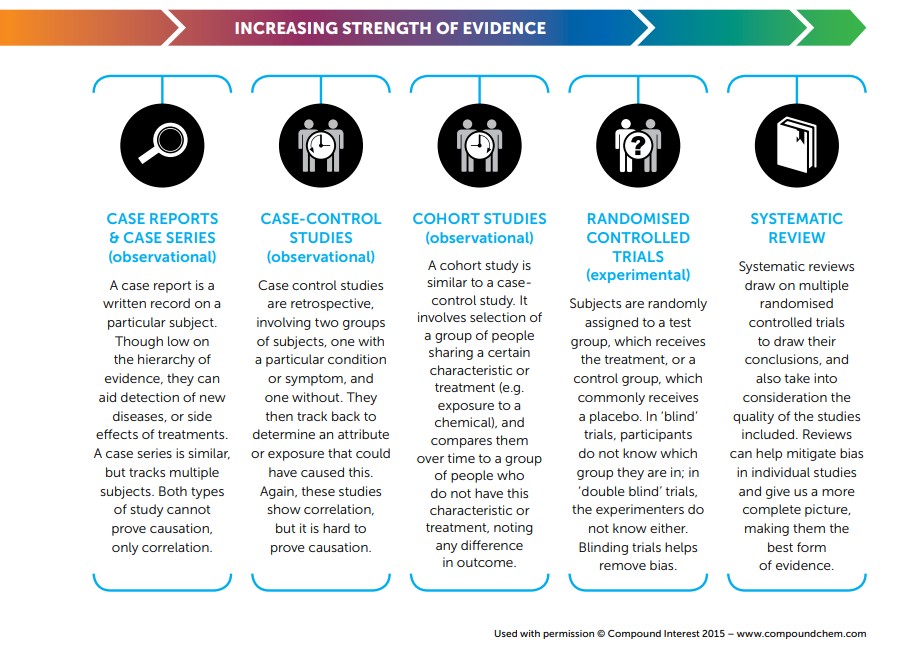What Distinguishes Scientific Results From Non Science-based Claims
The reliability of different types of evidence must be correctly determined and expert testimony must be based on the best available knowledge. So far we have discussed scientific knowledge scientific methods scientific change and scientific progress.

Types Of Scientific Evidence Science Media Centre
A pseudo-scientific theory makes claims that.

. Along these lines how do you distinguish a scientific claim from a non-scientific claim or pseudoscience. An important component of being able to distinguish science from non-science is being able to determine the validity of information whether that be verbal eg TV YouTube podcasts or written published. Pseudoscience refers to claims that appear to be based on the scientific method but are not.
Despite all these philosophical investigations of science we havent yet had a focused discussion on what makes science what it is or what differentiates it from other human endeavours. In a world where scientific theories often sound bizarre and counter to everyday intuition and where a wide variety of nonsense aspires to be recognized as scientific its important to be able to separate science from non-sciencewhat philosophers call the demarcation problem. Construct a claim that you consider scientific and indicate how the claim meets the criteria for science - that it is falsifiable and repeatable.
Scientific results are distinguished from non-science-bases claims in that science is based on body of knowledge based on nature worlddeveloping explanations and rooted in observationexperimentation whereas non science is based on. Science is open to constant revision as new facts are discovered and integrated into the emerging picture of the world it seeks to formulate. Objective results are obtained via automated processes whereas subjective results are obtained via scientists.
Inaccurate results can be decisively and quickly removed from the canon of scientific truth. Rather than modify an outdated premise when it finds new observations in a non-scientific theory the data may itself be ignored or denied. Nonscientific and scientific research vary in their definitions and methods.
Therefore courts must be able to distinguish between science and pseudoscience. Challenge your peers to either agree or disagree with the scientific nature of your claim. Discover these differences through an explanation of how nonscientific research is conducted through tradition.
Is the treatment unable to be tested or disproved. What makes one statement or claim science. One of the most beautiful examples of this is the periodic table of elements.
The ten criteria for distinguishing between scientific and pseudoscientific treatment claims are. By contrast non-scientific theories tend to be more dogmatic. The falsifiability criterion allows within certain limits to distinguish a scientific theory from a non-scientific one.
Furthermore the moon could be sampled repeatedly and we would still arrive at the same conclusion the moon is not made out of cheese. Construct a claim that you consider scientific and indicate how the claim meets the criteria for science that it is falsifiable and repeatable. Chemistry questions and answers.
Does the treatment approach remain unchanged even in the face of contradictory evidence. A scientific theory makes claims that are testable. My post about how to distinguish real science from fake science generated some interesting comments especially over my assertion that we have not as yet been able to come up with an unambiguous way to distinguish science from non-science and it prompted me to post a follow-up to try and clarify it.
Scientific tests are what. Distinguishing science from non-science. Terms in this set 6 Difference between scientific method and other claims.
Thus the claim is scientific because it may be disproved through collection of evidence data. Science is a process of discovery and part of that process of discovery requires the recognition of patterns. There are other theories as well.
A rigorous science is able to make testable predictions. Sometimes it is in the interest of litigants to present non-scientific claims as solid science. Along these lines how do you distinguish a scientific claim from a non-scientific claim or pseudoscience.
Challenge your peers to either agree or disagree with the scientific nature of. A non-scientific claim cannot be disproved regardless of the evidence collected. That is to say these claims are conceivably refutable.
Meanwhile Thomas Kuhn has advanced the notion that science is inherently a communal endeavor and that what distinguishes science from non-science is the way in which the scientific community functions. Distinguishing Fake from Real News. That is science rests on certain axioms that non-science does not rest on.
Objectivity is supposed to be empirical and unbiased whereas subjectivity stems from individuals own beliefs and interpretation. Moreover to me axioms should in. We have taken for granted that science is something different something unique.
Science begins with methodological rationalism whereas non-science is heavy with beliefs that may not even have an ethics of belief attached to them thus are not starting with methodological system of methods in thought actions or conclusions by means of a sold relation to valid and reliable reason andor evidence like science. What makes one statement or claim science. The claims it makes prohibit particular events or occurrences from happening.
Construct a claim that you consider scientific and indicate how the claim meets the criteria for science that. Previously published in December 2014.

The Planning Evaluation Cycle Evaluation Program Evaluation Research Methods

The 6 Elements Of Persuasion Infographic Persuasion Psychology Social Media
Comments
Post a Comment